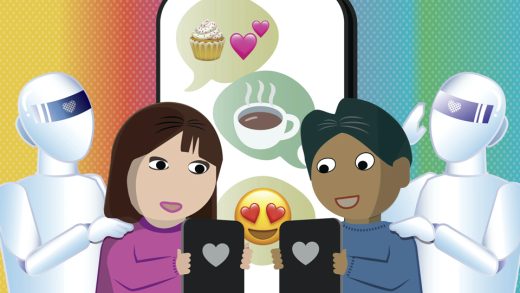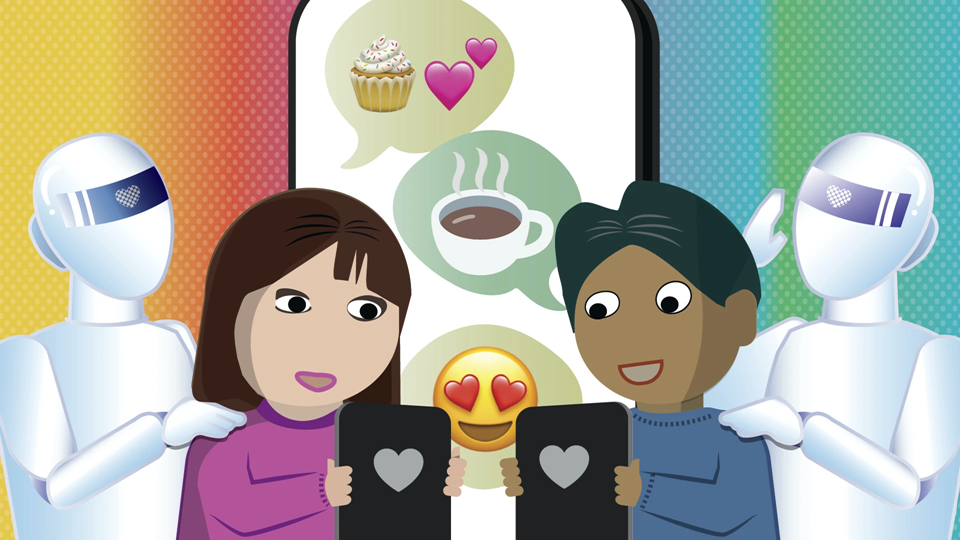Rizz dating app cofounder explains how AI works as a wingman
Rizz dating app cofounder explains how AI works as a wingman
Rizz analyzes screenshots of conversations you’re having on other platforms—from Tinder to iMessage—and crafts reply suggestions.
Can artificial intelligence be an effective wingman?
Roman Khaves, cofounder and CEO of Rizz, thinks so. The AI dating assistant app analyzes screenshots of conversations you’re having on other platforms—from Tinder to iMessage—and crafts reply suggestions. Rizz has amassed millions of downloads since launching in 2022, with more and more competition also emerging into the dating scene since.
Khaves recently spoke with the Associated Press about the demand for this kind of platform, how AI is being used to find in-person connections, and what guardrails are needed to bring AI technology into such an intimate part of our lives. The interview has been edited for clarity and length.
Q: How does Rizz work?
A: Rizz is an AI dating assistant. If you’re stuck in a conversation or you don’t know how to open up on a dating app, you can pull out Rizz and upload a screenshot of a particular profile or conversation you’re having trouble with on that other platform. It will give you tons of suggested replies—and also a strategy on how you could start the conversation or respond to certain things.
The more you use Rizz, the more it understands what type of replies you like. And that trains the model to improve over time.
Q: Why launch this kind of app?
A: Three years ago, I personally found myself stuck in the middle of dating app conversations. Sometimes, I would take a screenshot to send to some of my friends and say, “Hey, what do I say next?” And we knew there had to be a better way.
The moment that ChatGPT hit the scene, that’s when we launched Rizz. We integrated the API technology with our product to make it possible. And we saw immediate traction. We’ve had more than 7.5 million downloads to date, growing about 30% month over month, since launching in 2022. There’s clear demand for this type of product.
Q: Who are your biggest competitors?
A: I’d say at least 40% of our screenshots and conversations come from messaging apps like iMessage and Instagram. We get a lot of Instagram, which I would argue is the biggest dating app in the world today—and Instagram recently added an AI feature that can give you different variations of how to rephrase a message, like more funny or witty suggestions.
So, for now, Instagram is a huge competitor. Tinder also has suggested openers. It’s still very different than what we do—we take it a step further and we give users a strategy—but I think those are the biggest competitors, as well as ChatGPT. And there’s many similar apps now and new ones emerging every single day.
Q: What would you say to folks who may be concerned about bringing AI into their dating life? Where do there need to be guardrails?
A: We’re not trying to replace human connection. We’re just trying to help people get to the date in the first place—because it is hard out there. A lot of people don’t even know how to start conversations online, and I think AI is helping boost that confidence.
Still, privacy and control is critical in this new world of AI. We could have built Rizz very differently. We could have made it so that Rizz would respond automatically or connect to the dating apps—but we don’t do any of that. All users are in control of exactly what gets sent out to their match. And we are going to continue building with these priorities in mind.
Q: What’s next for AI and dating?
A: A lot of the big dating companies are thinking about how to leverage AI in order to enhance human connection in this space today. That’s also what we set out to do, and are still improving on.
Rizz is currently built to help you get off dating apps as quickly as possible. Next, we might want to help you beyond the first date, perhaps with future date ideas or something like birthday gift ideas. It’s really about supporting the user throughout their journey.
—Wyatte Grantham-Philips, Associated Press business writer
(11)



